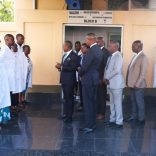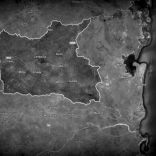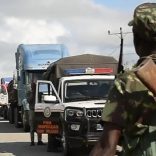Mozambique launches first forensic DNA laboratory - Watch
Hidden debts: Huge sums paid in cash evade the financial system – AIM report

File photo: Lusa
At the trial before the Maputo City Court of 19 people accused of financial crimes in connection with the country’s “hidden debts”, the spotlight on Thursday remained on the real estate dealings of Angela Leao, wife of Gregorio Leao, the former general director of the country’s Security and Intelligence Service (SISE).
A complex web of financial transactions surrounds Angela Leao’s property portfolio, involving others among the accused, including her sister, Mbanda Henning, and the contractor Fabiao Mabunda and his building company, MMocambique Construcoes.
The court has been looking in detail at Angela Leao’s properties, and how they were paid for. The ultimate source of the money, according to the prosecution, was a bribe of over nine million dollars intended for Gregorio Leao, but paid via Fabiao Mabunda and MMocambique Construcoes. Angela Leao hired Mabunda for much of the work on her properties, and their bank accounts seemed intertwined.
The first witness called on Thursday was Eugenia Mapandzene, who was the first wife of Gregorio Leao. In 2015, she was attempting to buy an apartment in central Maputo, and to do this she needed to change US dollars into meticais.
She sought assistance from Khessaujee Pulchand, who was working at the now extinct foreign exchange bureau, Africambios, and has also been charged with money laundering in connection with the hidden debts.
Pulchand acted as a middleman and told Mapandzene she could obtain a more favorable exchange rate if she changed her money at a company called Hydrofarma. “At the time, the exchange rate was 37 meticais to the dollar, but he told me he could get me 38”,recalled Mapandzene.
The apartment Mapandzene wanted, owned by the company Cimac, cost around 9.5 million meticais – equivalent to 250,000 dollars. So she paid that sum to Hydrofarma, and 9.5 million meticais showed up in the Cimac account.
It was not until she looked at the papers in more detail that Mapandzene found the money had not been paid by Hydrofarma at all, but by MMocambique Construcoes.
She admitted that she had no idea what the original source of the money was – and she did not care. “What mattered to me was that the apartment should be paid for”, she said. “I didn’t know MMocambique Construcoes or Fabiao Mabunda”.
Asked whether Pulchand had ever explained the source of the money, she replied “at no time”. But she had used him to change money before, and found nothing strange in his decision to use a company to do the operation.
Carlos Malate, the owner of Hydrofarma, told the court he had sold an apartment in central Maputo to Angela Leao in 2015. Initially he did not know whom he was dealing with, since Leao used middlemen – a relative named Nelson Buque and a man he named only as Pinto.
They signed an agreement under which Angela Leao would buy the apartment for 1.6 million dollars in four instalments. But something went wrong, and by the end of 2015, Leao still owed Hydrofarma 350,000 dollars.
So an addendum to the agreement was signed, rescheduling the payment, and imposing a “compensation” of an extra 100,000 dollars for the late payment, bringing the total price to 1.7 million dollars.
When a public deed transferring the apartment was signed, Malate was surprised to find that the final beneficiary was not Leao, but her sister Mbanda Henning.
Malate claimed that, with the exception of the bank transfer of 250,000 dollars from Eugenia Mapandzene via MMocambique Construcoes, this entire sum was paid in cash. He expected the court to believe that Leao and her agents were carrying hundreds of thousands of dollars in banknotes on their persons.
His explanation for this was that Hydrofarma needed ready cash to pay seasonal workers, to make purchases of building materials on the informal market, and to pay off debts. Malate said this was absolutely normal in a building company with a cash flow of 200,000-300,000 dollars a month.
Judge Efigenio Baptista was not convinced. “So you have no way of proving that this money ever entered the Mozambican financial system?”, he asked.
Nor could Malate explain exactly what the money was used for. As money came in, so the company spent it, he said.
Worse still, Malate’s mathematics made no sense. The court documents contain a series of Hydrofarma receipts that come to considerably more than the 1.7 million dollars owed by Leao, but Malate insisted that only 1.7 million was paid.
He blamed the problem on “failings” in the company’s “disorganized” accounts department.
Furthermore, financial documents in the court’s possession showed that not everything was paid in cash. Prosecutor Sheila Marrengula said that, in addition to the 250,000 dollars from Mapandzene, MMocambique Construcoes had transferred 28,000 dollars to the Hydrofarma account. Were here any other hidden transfers, she asked.
“We didn’t know that a company called MMocambique Construcoes was transferring money to us”, claimed Malate.
“It’s a problem of ignorance”, he added.
“You’re not ignorant!”, retorted the judge.
Repeatedly both Baptista and Marrengula asked for evidence that the money had entered the financial system, but none was forthcoming. “We’re going round in circles”, remarked Baptista.
The trial has been adjourned until Friday.













Leave a Reply
Be the First to Comment!
You must be logged in to post a comment.
You must be logged in to post a comment.